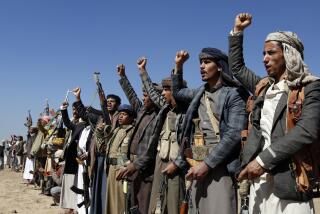Yemen’s protesters unswayed by deal to oust president
A political deal for Yemeni President Ali Abdullah Saleh to relinquish power within 30 days failed to persuade thousands of antigovernment protesters spread across the nation Sunday to reel in their banners, fold up their camps and go home.
“We’re not leaving,” said Hassan Luqman, a protest organizer who sat inside a tent in the capital, Sana, listening to the rattle of rain and surfing the Internet while planning new rallies against Saleh’s autocratic 32-year rule. “We know our struggle won’t end anytime soon.”
A tentative agreement reached a day earlier between leading political opponents and Saleh’s ruling party called for the president to step down within 30 days in exchange for immunity from prosecution. Diplomats credited the plan as a move toward ending two months of turmoil and bloodshed, but the deal fell short of the central demand by hundreds of thousands of demonstrators that Saleh resign immediately.
The protesters are a potent, if leaderless, force — much as their counterparts were in the Tunisian and Egyptian revolutions. They are suspicious of political parties and fear that compromising their demands will weaken their movement and give Saleh a chance to regain momentum and possibly stay in power.
The protesters now find themselves caught amid the nuance, ploys and power struggles of international politics.
Yemen’s official opposition bloc, strongly represented in the protests but by no means its voice, has conditionally accepted a deal brokered by the Gulf Cooperation Council for Saleh to form a unity government and step down within 30 days. After that, new elections would be scheduled.
The document “requires all parties to withdraw instigators of political and security tensions.” Ruling party officials have interpreted the clause to mean that protests and sit-ins around the country must stop before a unity government begins its work. Opposition leaders regard the “instigators” to be pro-government gunmen, who since February have killed scores of peaceful protesters.
The opposition’s larger problem, though, is not being able to control the protesters. What started two months ago as a seemingly hopeless campaign by 60 students to camp at the main gates of the Sana University campus until Saleh steps down has turned into a movement that encompasses every major sector of society — the tiny middle class as well as tribal sheiks, army generals and Islamic insurgents.
“It is their right to reject it,” Abdul Wahab Anisi, a leader of the opposition Islah party, said of the protesters’ reaction to the deal. “It’s … best that the revolutionary movement remain skeptical of these political dealings. The protests have achieved these advancements at a great price, and they want all their key demands to be fully realized.”
Immunity for the president on charges of corruption and killing protesters, a key part of the Gulf council proposal, is an affront to antigovernment demonstrators, who have seen members of their ranks beaten and shot by security forces loyal to Saleh’s family. More than 120 people have died in protests that have shaken an impoverished country already struggling with a secessionist movement and an active Al Qaeda affiliate.
“If he weren’t corrupt, and he weren’t responsible for these awful crimes against the Yemeni people, then why would he want immunity so badly?” said Waleed Ammari, a protest organizer. “We want him to leave the country so he can’t provoke more trouble — then perhaps he can come back and face trial.”
The protesters’ defiance puts the opposition in an awkward spot. Opposition leaders want to cooperate with the U.S. and Gulf council countries, including Saudi Arabia and the United Arab Emirates, in ending the unrest. But they don’t want to appear to be political opportunists seeking to gain from the protesters’ struggle. The opposition’s strategy is to quickly shift blame to Saleh if the protesters don’t disperse and the deal for him to exit is jeopardized.
“This is his problem,” said Mohammad Abdul Malik Mutawakkil, a key opposition leader. “The people are tired and can no longer accept his rule.”
As diplomats huddled and negotiations between politicians and tribal leaders took place in government corridors, protesters turned out in the rain on the streets and squares of Sana. Many predicted their victory was near. A young boy raised aloft on his father’s shoulders shouted, “Hey Ali, get out!” His father flashed the victory sign.
A special correspondent in Sana contributed to this report.
More to Read
Start your day right
Sign up for Essential California for news, features and recommendations from the L.A. Times and beyond in your inbox six days a week.
You may occasionally receive promotional content from the Los Angeles Times.







